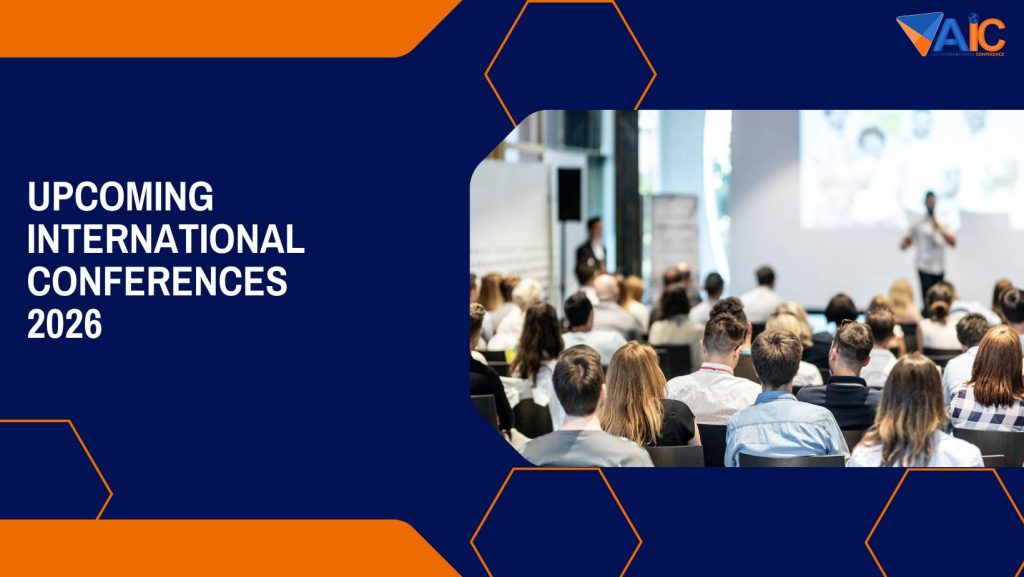International conferences have become one of the most powerful platforms for academic and professional growth. For researchers, these events provide an opportunity to present groundbreaking studies, gain peer recognition, and explore collaborative opportunities with experts worldwide. For students, international conferences serve as a stepping stone to the professional world, enabling them to sharpen their skills, broaden their knowledge, and connect with global academic communities.
The year 2026 is anticipated to be a landmark in the academic calendar. With the world recovering fully from disruptions of the past decade, the demand for cross-border collaboration and knowledge exchange is higher than ever. Universities, research institutes, and organizations across continents are preparing to host large-scale events in both physical and hybrid formats.
From cutting-edge science and technology to pressing global issues like climate change, sustainability, and healthcare, the topics scheduled for 2026 conferences reflect the most urgent and innovative areas of human progress.
How to Prepare for an International Conference in 2026
Creating a Strong Research Presentation
Design slides that are clear, concise, and visually appealing. Include graphs, infographics, and case examples. Practice repeatedly to deliver confidently in front of an international audience.
Building an Academic Portfolio Before Attending
Compile achievements, abstracts, and previous publications in a digital portfolio. Having these ready makes networking more effective, as peers can better understand your work.
Packing Essentials: Research Materials, Business Cards, and Digital Backups
Always carry backup copies of your presentation, abstracts, and contact details. Business cards leave a professional impression and help in building networks.
Benefits of Attending International Conferences
Knowledge Sharing and Learning Opportunities
International conferences serve as platforms where knowledge is shared not just through presentations but also through discussions, debates, and workshops. Unlike traditional classroom learning, conferences allow participants to engage with unpublished research, early findings, and case studies directly from experts. For example, an engineering student attending an innovation conference may gain insights into prototypes and technologies that are still in the research stage, providing them with a competitive advantage in their studies and career.
Networking with Global Experts and Peers
Networking is often described as the “hidden curriculum” of conferences. Beyond formal sessions, informal conversations during coffee breaks, lunches, and poster sessions often lead to collaborations that shape careers. Meeting peers working in similar fields builds long-term connections, while interacting with experts can result in mentorship opportunities. For students, such interactions often lead to Ph.D. offers, joint research publications, or internships with international labs.
Publishing and Presentation Opportunities
Conferences provide platforms for presenting research through oral presentations, poster sessions, and workshops. A well-delivered presentation not only gives recognition but also opens doors to publication opportunities in indexed journals such as Scopus, Web of Science, IEEE Xplore, and Springer. These publications hold immense weight in academic careers, especially for those planning postgraduate studies or applying for research grants.
Career Advancement for Students and Researchers
Attending international conferences adds significant value to resumes and academic CVs. Employers and academic institutions value individuals who demonstrate active participation in global academic communities. For researchers, presenting at high-impact conferences increases visibility, boosts citations, and often leads to invitations to join editorial boards or collaborative projects. For students, participation often translates into scholarships, job placements, or Ph.D. guidance.
Major Academic Conference Categories in 2026
Science and Technology Conferences
With rapid advancements in artificial intelligence, machine learning, biotechnology, and space exploration, 2026 will host landmark conferences in these areas. For instance, the International Conference on Artificial Intelligence (ICAI) will likely focus on the ethical applications of AI in daily life, while nanotechnology conferences will highlight medical and industrial breakthroughs.
Medical and Healthcare Conferences
Healthcare remains a global priority. Conferences in 2026 will focus on vaccine research, telemedicine, genetic engineering, and mental health awareness. Such events allow medical students and healthcare professionals to interact with doctors and researchers addressing global pandemics, chronic illnesses, and digital health solutions.
Business, Economics, and Management Conferences
The global economy continues to evolve with the rise of fintech, cryptocurrency, and digital markets. Business conferences in 2026 will explore sustainable business models, leadership strategies, and global financial reforms. Students pursuing business management will gain hands-on exposure to international case studies and market forecasts.
Engineering and Innovation Conferences
From smart city designs to renewable energy solutions, engineering conferences in 2026 will highlight innovations shaping the future. These conferences often feature prototype exhibitions, giving students direct exposure to industry-level projects that bridge the gap between academia and practice.
Arts, Humanities, and Social Sciences Conferences
In 2026, these conferences will address global issues such as cultural preservation, digital learning in education, migration, and global inequality. Students attending such conferences benefit from cross-disciplinary learning, which enriches their critical thinking and cultural awareness.
Environmental and Sustainability Conferences
Climate change is a defining issue of our time. Conferences in this field will focus on renewable energy, sustainable agriculture, water conservation, and climate policy. With global governments emphasizing sustainability, these conferences will have strong policy-making implications.
Top International Conferences in 2026 by Region
North America (USA & Canada)
North America continues to dominate the global academic scene. The USA will host large conferences in medicine, data science, and aerospace. For instance, Boston and San Francisco will likely host major biotech summits. Canada, known for its environmental research, will attract international participants for sustainability-focused conferences.
Europe (UK, Germany, France, etc.)
Europe offers a unique blend of tradition and innovation. The UK will remain a hub for conferences in humanities, law, and healthcare. Germany, with its strong engineering background, will host major innovation and industrial design conferences. France will continue to lead in cultural and social science gatherings.
Asia-Pacific (India, China, Japan, Australia)
India is fast emerging as a conference hotspot, especially in technology, management, and medicine. China will continue to dominate in engineering and AI. Japan’s expertise in robotics and automation makes it a leader in futuristic tech conferences, while Australia remains a center for environmental and marine science events.
Middle East & Africa
The Middle East, particularly the UAE and Saudi Arabia, is investing in renewable energy and technology-based conferences. Africa is making significant strides in hosting academic gatherings focused on agriculture, healthcare, and sustainable development, ensuring inclusivity in global discussions.
Latin America
Latin America is focusing on cultural studies, healthcare, and agricultural innovation. Countries like Brazil and Mexico are positioning themselves as hosts for conferences that promote diverse research perspectives from the Global South.
How to Choose the Right Conference in 2026
Aligning with Research Interests
Students and researchers must select conferences that align closely with their academic goals. For instance, a student researching AI in healthcare should target interdisciplinary conferences that bridge both fields.
Considering Conference Reputation & Indexing
Attending well-recognized, indexed conferences ensures that research gets the visibility it deserves. Always check whether the conference proceedings are listed in global indexing platforms.
Budget and Funding Opportunities
Conference participation can be expensive. Universities, NGOs, and research councils often provide travel grants, fellowships, or student discounts. Always apply early to secure funding.
Location and Accessibility
Travel convenience and visa requirements should not be overlooked. Choosing accessible destinations ensures smoother participation without last-minute hurdles.
How to Choose the Right Conference in 2026
Aligning with Research Interests
Students and researchers must select conferences that align closely with their academic goals. For instance, a student researching AI in healthcare should target interdisciplinary conferences that bridge both fields.
Considering Conference Reputation & Indexing
Attending well-recognized, indexed conferences ensures that research gets the visibility it deserves. Always check whether the conference proceedings are listed in global indexing platforms.
Budget and Funding Opportunities
Conference participation can be expensive. Universities, NGOs, and research councils often provide travel grants, fellowships, or student discounts. Always apply early to secure funding.
Location and Accessibility
Travel convenience and visa requirements should not be overlooked. Choosing accessible destinations ensures smoother participation without last-minute hurdles.
Tips for Students Attending Conferences
Preparing Abstracts and Papers
Always check formatting, grammar, and plagiarism before submitting. Even minor errors can lead to rejection. Make sure your abstract clearly shows the importance of your research and follows the conference guidelines. Getting feedback from mentors or peers can help polish your work.
Presentation Skills for First-time Speakers
Keep slides clean with visuals and fewer words. Rehearse multiple times to build confidence. Storytelling makes your talk more engaging, while speaking slowly and clearly ensures everyone understands. Avoid jargon unless necessary and always keep your audience in mind.
Building Professional Networks
Conferences are the best place to meet experts and peers. Use coffee breaks, poster sessions, and Q&A to introduce yourself and share your research interests. Always exchange contacts and continue the conversation on LinkedIn or ResearchGate. A single connection can lead to future collaborations or career opportunities.
Student Discounts and Travel Grants
Many organizations offer student travel grants such as Erasmus+, DAAD, and Fulbright. Apply early and highlight why attending the event is valuable for your academic career. Also, check for student discounts on travel, accommodation, or early registration to save costs.
Mistakes to Avoid While Attending International Conferences
Submitting Abstracts Without Proofreading
Even strong research can be undermined by careless mistakes. Typos, grammatical errors, and formatting inconsistencies create a negative impression and reduce credibility. Before submission, proofread multiple times and ask mentors or peers for feedback. Remember, well-polished writing reflects professionalism and increases acceptance chances.
Poor Time Management During Sessions
With multiple tracks and sessions happening simultaneously, poor planning often results in missing key discussions. Instead of trying to attend everything, review the schedule beforehand and prioritize sessions most relevant to your field. Use mobile apps or conference planners to create a personal agenda. Balance between lectures, poster sessions, and networking to maximize your experience.
Not Engaging in Networking Opportunities
Many students attend conferences only to listen passively, missing the chance to expand their networks. Avoid isolating yourself—initiate conversations, ask questions, and attend informal gatherings. Building connections is equally as valuable as gaining knowledge because future collaborations often begin at conferences.
Digital and Hybrid Conferences in 2026
Rise of Virtual and Hybrid Conference Models
Post-pandemic, hybrid models have become the new norm, offering both in-person and online participation. This flexibility helps conferences reach larger audiences globally. Organizers are increasingly investing in high-quality live streaming, interactive sessions, and networking tools to provide an engaging experience regardless of physical presence.
Advantages for International Researchers and Students
For students who may face budget or visa constraints, hybrid conferences are a lifeline. They reduce travel and accommodation expenses, making international exposure more affordable. Recorded sessions allow participants to revisit talks and learn at their own pace. Additionally, hybrid models ensure inclusivity by enabling students from developing countries to contribute to global academic discussions.
Tools and Platforms to Maximize Online Participation
Students should familiarize themselves with digital tools like Zoom, Microsoft Teams, Whova, and Hopin before the event. These platforms often provide breakout rooms, live Q&A, polls, and networking lounges. Preparing your tech setup—stable internet, proper lighting, and a working microphone—ensures smooth participation. Engaging actively in chats and discussion forums also helps make meaningful connections even in virtual settings.
Key Deadlines and Registration Tips
Abstract Submission Deadlines
Abstract deadlines usually arrive months before the actual conference date. Procrastination often leads to rushed submissions, reducing quality. Begin preparing abstracts early, revise multiple times, and track deadlines using digital calendars or reminder apps.
Early Bird Registrations
Most conferences offer discounted “early bird” rates to those who register in advance. Beyond saving money, early registration also secures your place, as many prestigious conferences have limited seats. It also allows more time to arrange travel, accommodation, and funding.
Visa and Travel Planning for International Attendees
Students traveling abroad must prepare visa applications well in advance since processing times vary. Ensure that your passport, financial documents, invitation letters, and conference confirmations are all in order. Booking flights and accommodation early not only saves costs but also reduces last-minute stress.
Future Trends in International Conferences Beyond 2026
Increasing Role of AI and Technology in Academic Events
Artificial Intelligence will play a major role in conference organization, from AI-assisted paper reviews to chatbots for attendee support. Personalized schedules based on research interests and AI-driven matchmaking tools will help participants connect with the right people and sessions.
Sustainable and Eco-friendly Conference Practices
With growing awareness of climate change, conferences are adopting sustainable practices such as going paperless, using digital badges, minimizing plastic use, and choosing venues powered by renewable energy. Many conferences will also promote virtual attendance options as part of their green initiatives.
Greater Inclusivity and Global Collaboration
Future conferences will place a stronger emphasis on inclusivity by encouraging participation from underrepresented groups and developing nations. Language translation tools, hybrid access, and scholarship opportunities will make global collaboration more feasible. These initiatives will foster diverse perspectives and strengthen the global research community.
By planning early, selecting the right conference, and avoiding common pitfalls, attendees can transform these events into life-changing opportunities. The future of global conferences is not just about academic discussions but also about shaping collaborative solutions for the challenges of tomorrow.
FAQs
1. Why should researchers and students attend international conferences in 2026?
To gain knowledge, network globally, and boost academic careers. They also get international exposure and recognition for their work.
2. What types of conferences will be held in 2026?
Science, technology, medicine, business, engineering, social sciences, and sustainability. Interdisciplinary conferences are also increasing, offering broader opportunities.
3. Which regions will host major conferences in 2026?
USA, Canada, UK, Germany, India, China, Japan, Australia, UAE, and Brazil. Each region offers unique themes, making global participation highly diverse.
4. How can students benefit from attending?
They get presentation experience, scholarships, and career opportunities. Students can also collaborate on projects and gain mentorship.
5. How to choose the right conference?
Match your research interest, check indexing, budget, and location. Always review past conference proceedings for quality assurance.
6. What are the key deadlines to track?
Abstract submission, early-bird registration, and visa applications. Missing deadlines can reduce chances of participation or higher costs.
7. What mistakes should be avoided?
Submitting unproofed abstracts, poor time management, and avoiding networking. Not following conference guidelines can also affect acceptance chances.
8. How should students prepare?
Prepare a strong presentation, academic portfolio, and carry essentials. Practice public speaking and rehearse your research pitch beforehand.
9. Will hybrid conferences be popular in 2026?
Yes, they will make participation more flexible and affordable. They also reduce travel costs while ensuring global visibility.
10. What are future trends beyond 2026?
AI-driven events, eco-friendly practices, and global inclusivity. Expect smarter tools, digital networking, and sustainable venues.



